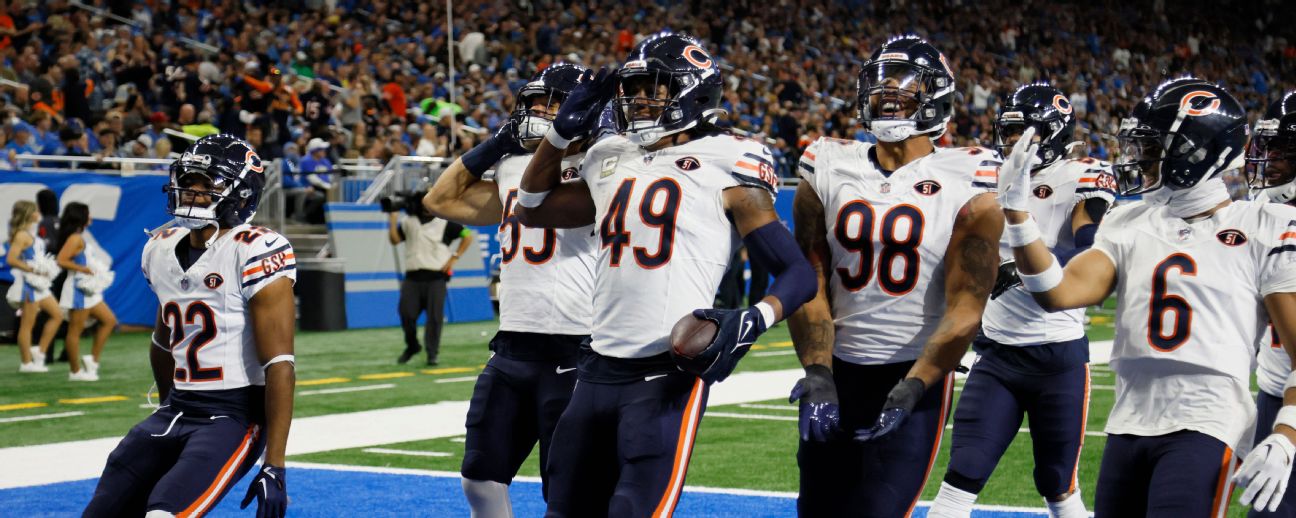
The story was evident in Matt Eberflus’s smile.On Monday, he was questioned about whether he had watched the two non-pass interference rulings against the Packers at the end of the Green Bay-Kansas City game.Bears tight end Cole Kmet had also observed them and made a clear judgment as to whether or not he believed they were DPI penalties.
“I did, on both of them, I did,” he affirmed.Kmet naturally has a predisposition against the defense because he is a tight end who receives passes. In addition, Green Bay played defense. As a player for the Bears and a lover of the Chicago area, he has bias against them.
Instead of getting himself into trouble by admitting he saw the calls, Eberflus chose to take the high road and explain why pass interference penalties keep happening or don’t get called, and possibly why they’re just difficult to call. A similar situation to those non-calls occurred in the Monday night game on what seemed to be an obvious pass interference against Cincinnati. The DPI and OPI controversies keep rolling in the NFL.
According to the Bears coach, “it’s the timing.” “The journey there takes longer. It is the DBs’ timing. At the crucial moment, he must exude poise. Thus, in the end, that requires some discernment.
“You got to be able to judge the ball, where the player is running to and where that reception area is, and be able to time your jump, your punch to bust that triangle that he’s (the reciever) trying to create with the ball.”Time is everything. Much of it comes from instincts. As a coach, you can work on it, but some of the truly exceptional ones have it. They naturally know when to jump when the ball reaches the receiving area.”
The Bears’ most significant penalty issues have not so much been pass interference as they have been their own false starts and biased call calls by the officials.
The NFL’s Bears have seen the fewest penalty flags against their opponents.
If smart play is represented by the letter “S” in Eberflus’ HITS philosophy, then the Bears are up against some extremely intelligent opponents.
Perhaps more needs to be said by the Bears about officials calling unfair games.
In Bears games, there have only been 51 penalties against opponents. 56 is the next-lowest total while playing opponents of Kansas City.
In contrast, Green Bay has received 71 flags versus Detroit’s 62, while Minnesota has benefited from 87 flags against its opponents.
The Bears have a penalty ratio of minus-29 when you take into account that they have been penalized the ninth-most times in the league (80).
The 395 yards allowed against Bears opponents is 67 yards less than the lowest total in the league.
The Bears have committed more penalties than their opponents in nine of their last ten games, as was noted last week. The one game in which they didn’t was a draw in penalties.
Their net yards ratio is minus 304 yards due to penalties. Nobody is closer to their poor net penalty yards ratio than 116 yards.
Eberflus responded, “Yeah, you want to eliminate those,” referring to all the penalties. Naturally, there are a lot of them that you disagree with. That much is true. However, the fines that were granted against us clearly indicate that the pre-snap items are the ones you wish to have control over. We have improved our performance in the last few weeks in dealing with false starts, and we must keep improving.
“We’ve been emphasizing that for the last several weeks, and we’ve got to continue to do a better job there.”
The Bears, who had led the league in false starts (20), are now fourth.
With six defensive pass interference flags, they are tied for second place, although they are just 17th in terms of illegal contact penalties.
“So anytime you can eliminate those, a lot of times the DPIs and the contact down the field, sometimes there’s a questionable and you’ve got to take those and move to the next set of downs and execute again,” Eberflus explained. “But yeah, those are the ones you want to talk about.”
Leave a Reply